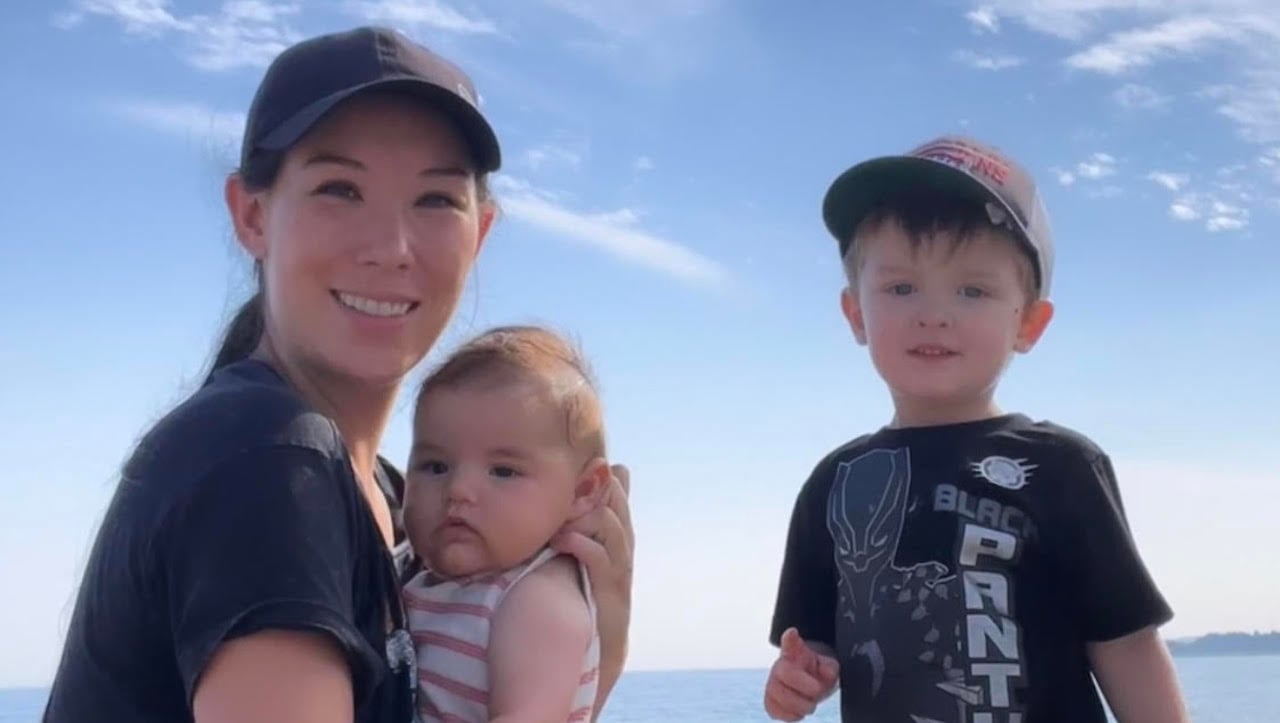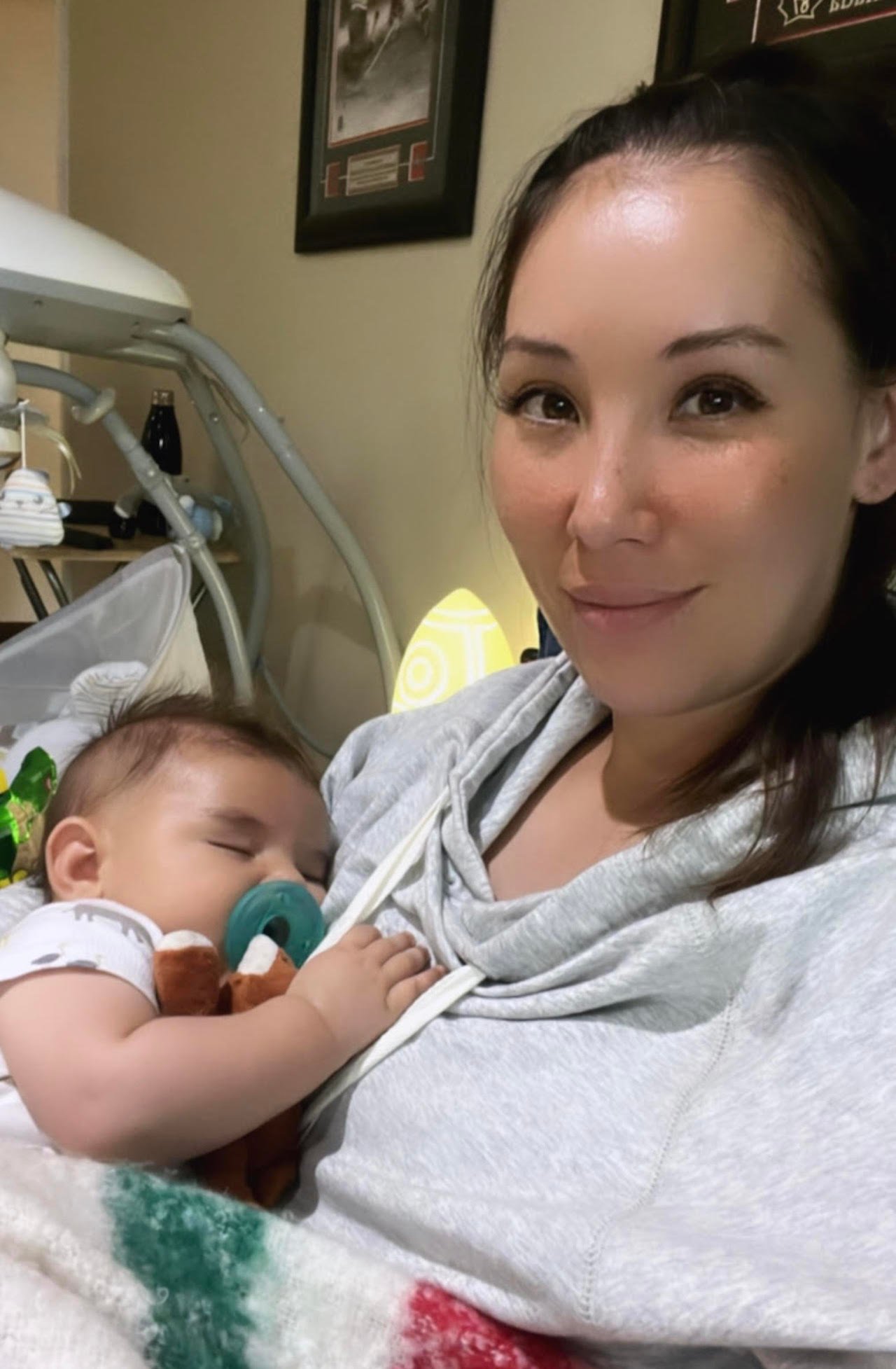
![]()

After my first was born in 2019, I experienced the typical “baby blues” that up to 80 percent of moms struggle with. I’d find myself randomly crying during episodes of The Price is Right. So when I got pregnant with my second, I was prepared for the same experience—although I hoped for better, feeling confident about knowing what was coming this time around.
After a challenging pregnancy, I was relieved to go into labour at 41 weeks and had a positive birth experience. In fact, so positive that we checked out of the hospital only eight hours after the baby was born and went out for breakfast at the local diner. I was feeling great and high on life.
On my third day postpartum, however, a thought randomly popped into my mind, seemingly out of nowhere: “You’re not capable of handling this.” From that moment on, I spiralled mentally into the darkest and most difficult time of my life. By day five, I reluctantly confessed to my partner that I had not only thoughts but an actual plan to take my own life. An hour later, I was in the hospital, being cared for by nurses and the emergency psychiatric team. Throughout it all, I just kept thinking to myself, “How did this happen?”
Over the next few weeks, I struggled greatly to see light at the end of the tunnel, to find any possible way out of the terrifyingly dark thoughts that consumed every moment of the day and made sleeping nearly impossible. Yet today, at four months postpartum, I can confidently share that I am happier than I’ve been in years and very much enjoying this new journey and stage of motherhood.

Photo: Courtesy of Kathryn Ross
If you’re in a dark place, I promise there’s a path out of it. Here’s what I would tell any parent in the depths of postpartum depression—because these are things that helped me survive.
Quick Contents
1. Tell someone
The hardest moment for me was recognizing that I wasn’t just thinking about ending my life, but was planning it. Because I work in the mental health field, I knew how serious this was, so I pushed myself to tell my partner and parents, as hard as it was to admit it. Whether you have thoughts or a plan, tell someone.
2. Accept help
I took pride in doing it all on my own. However, I needed to completely let go of this pride and accept any and all help from family and friends. It left me feeling guilty and vulnerable, but I knew it was the best thing for my family and recovery.
3. Ask for help
While some people may instinctively recognize what you need, most want to help but don’t know how. It took a lot of courage and vulnerability for me to reach out to friends and family for help, but I know I would’ve done the same for them and pushed myself to let go of this guilt.
4. Be open to various treatment options
Everyone has different levels of comfort with the treatment options for postpartum depression and the idea of medication while breastfeeding made me nervous. Ultimately, I decided that I needed it as a part of my treatment plan and I am grateful for that decision. Medication is not for everyone, but I believe it was important for me to be open to it and remove the stigma attached to it.
5. Journal
One of the key treatments for postpartum depression is sleep, but I found myself lying awake at night with a thousand thoughts rolling through my mind. Before going to sleep each night, I would journal and write down every thought in my mind without judgment or hesitancy. Writing these down, helped to externalize the thoughts rather than let them fester inside.
6. Take some time alone
I remember regularly feeling like I had lost myself. It helped to have small moments where I was on my own, outside of being a mother, even if that meant a five-minute walk with our dog.
7. Know the symptoms
When we have a cough and stuffy nose, we recognize these as symptoms of a cold and don’t assume these are everlasting. The same goes for postpartum depression. Thoughts such as I need to run away, I am a terrible mother or I will never get better are symptoms of postpartum depression, not facts.
8. Take it one moment at a time
I’m a planner and love to think weeks and months ahead, but in the depths of my PPD, that simply wasn’t possible. I found it difficult to even plan tasks for later that day. I started focusing on one moment at a time: “I’m going to get out of bed,” “I’m going to change my clothes,” “I’m going to wash my face.” This allowed me to go through the day without mental spiralling.
9. Try positive self-talk
When those dark thoughts would rear their ugly head and tell me I was incapable, I would say to myself out loud a hundred times a day, “you can do this”.
10. Exercise in the daylight
Initially, the idea of exercise felt extremely far-fetched. Even leaving my dark room felt impossible. However, the endorphins we can get from a short walk and daylight are extremely helpful. I started with simply sitting in a room that had daylight, and ultimately set the goal of going outside for a short walk each day.
11. Celebrate small wins
While a win with my first baby was going for my first five-kilometre walk, wins with my second were things like showering, eating and genuine laughing. Celebrate those, as the small wins ultimately become big ones.
12. Know that this too shall pass
You will get through this and better days are ahead. It’s essential to believe that, even if every fibre of your being is telling you it’s not true. I would rate each day out of a ten, most days being a 0 or 1, but ultimately that 1 became a 2 and that 2 a 3, until I found myself feeling like “me” again. I also reminded myself that postpartum depression aside, having a newborn is tough, and I deserve some grace, and so do you. You are doing a great job.
The post Postpartum depression almost killed me. Here’s how I survived appeared first on Today’s Parent.
Todays Parent
Today’s Parent is Canada’s #1 source for parenting content that informs, inspires and builds a sense of community. We help parents celebrate the happy chaos that comes with having a family and remind them that they are not alone. If you’re trying to conceive, pregnant or have children from newborn to ages 9+, you’ll get insightful information for all ages and stages on discipline, health, behaviour, education, plus easy and nutritious recipes and so much more.
